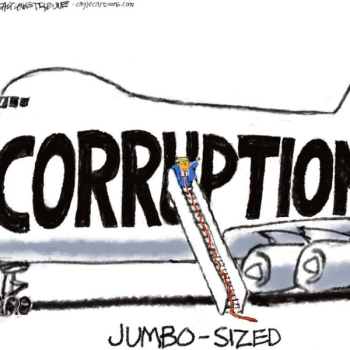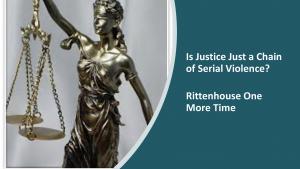
Is justice a serial killer? Or, with perhaps a tad more nuance: is justice just a chain of serial violence? Or, with still more nuance: when we pursue social justice do we risk scapegoating and, thereby, perpetuate the chain of violence unendingly?
The public theologian, armed with the doctrine of original sin, engages in discourse clarification as a means of shedding light on dark moments of history. The chain of events leading to the acquittal of Kyle Rittenhouse and its aftermath looks kinda like the OT talio, the law of revenge. In the name of universal and eternal justice, we seek to advance our own cause. Let’s hope that cause really is just and not something less.
In my recent Patheos posts on sin, I have developed the concepts of the visible scapegoat and the invisible scapegoat. My task has been to illuminate the darkness of our social mechanisms which insure that violence will never abate. I do not plan to develop scapegoating further here. Rather, I’d like to ponder aloud, so to speak, how the pursuit of justice links together violence and murder ad infinitum.
I will begin with a response to C. Don Jones’ recent Patheos post, “Rushing to Judgment and Kyle Rittenhouse.” I will then turn to the chain of events leading to the acquittal of Kyle Rittenhouse and the promise of more violence and murder to come. Finally, I’ll ask: what does this tell us about our human condition?
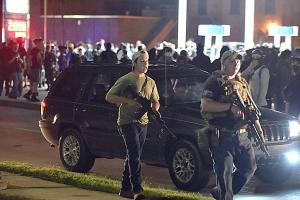
Rushing to Judgment and Kyle Rittenhouse
C. Don Jones has posted a thought piece worth thinking about, “Rushing to Judgment and Kyle Rittenhouse.” What Jones wants to avoid is scapegoating. The mob spirit risks scapegoating.
Jones wrings his hands as he sorts through the nuances. “The last few weeks has been a lesson in judgment. Or rather I should say judgementalism. As usual the sinful attitude infected many of us.”
“Don’t judge, so that you won’t be judged. You will receive the same judgment you give. Whatever you deal out will be dealt out to you.” (Matthew 7:1-2). Jesus’ words causes Jones to pause and ponder.
“My greatest fear is to scapegoat another person.,” says Jones. “Should Kyle Rittenhouse pay for all the sins of those who anger me? Of course not. … Is scapegoating ever the answer? No. It allows me to turn away from considering the log in my own eye. Scapegoating allows me to feel good about myself at the expense of another. It is the opposite of what Jesus taught us. We have to be very careful.”
Here is the hard message that Jones touts. “Justice is God’s business. This is a first principle in social relationships. God sees injustice, hears the cry of the oppressed, and holds the unjust accountable.”
To say that justice is God’s business helps me better understand the chain of violence that binds those of us who pursue justice. Our society demands justice, but the very demand for justice yields ideological conflict, violence, shooting, and sometimes murder. Christians used to call this original sin. Remember?
Is Justice just a Chain of Serial Violence?
No doubt you’ve heard more about the Rittenhouse trial than you want to. But, let me tell the story again using the chain metaphor. The pursuit of justice binds us into a chain of serial violence. Or, so it seems.
Very briefly, here’s the chain of events as chronicled by the New York Times.
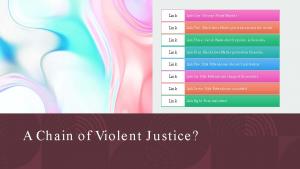
Link One. On May 25, 2020, George Floyd, a 46-year-old Black man, after being handcuffed and pinned to the ground by Derek Chauvin, a white police officer, died. Bystanders recorded video of the officer using his knee to pin Mr. Floyd by his neck during an arrest. Mr. Floyd could be heard repeatedly saying, “I can’t breathe,” in the video, as witnesses begged police officers to release him. 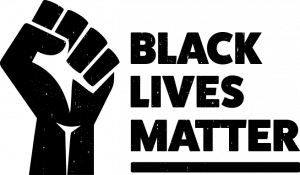
Officer Chauvin represents justice on Minneapolis streets.
Officer Chauvin was found guilty and sentenced to prison. Chauvin’s injustice was met by the court’s retributive justice.
Link Two. In the wake of George Floyd’s murder, Black Lives Matter protests broke out all around the world. The BLM movement cried out for racial justice.
Link Three. On August 23, 2020, Jacob Blake, a Black Kenosha, Wisconsin, resident, was shot and seriously wounded by a white police officer, Rusten Sheskey. Injustice once again cried out for justice.
Link Four. On August 24, 2020, BLM protestors flooded the streets of Kenosha, Wisconsin, demanding justice.
Link Five. On the night of August 25, 2020, Kyle Rittenhouse, then age 17, traveled from his home in Illinois to Wisconsin with a military style AR-15 rifle. He shot three protestors, killing two. Did Kyle think he was pursuing justice?
Then-presidential candidate Joe Biden referred to Rittenhouse as a “white supremacist.”
K. Edward Copeland, writing for The Gospel Coalition, could not denounce systemic racism more vitriolically. “When armed mass shooters (Kyle Rittenhouse, Dylan Roof, etc.) are apprehended without incident, and unarmed black people are killed out of fear that they might be armed, we have a more insidious problem than “a few bad apples.” This thing is cultural, pervasive, and abominable.” This vitriol led to counter vitriol. In the Daily Wire Ben Zeisloft wrote, “Calls Mount for Evangelical Publication to Retract Likening Kyle Rittenhouse to Mass Shooter.”
Link Six. On August 27, 2020, Kyle Rittenhouse was charged with five felonies and a misdemeanor, including two counts of first-degree intentional homicide for killing Joseph Rosenbaum and Anthony Huber. The court was seeking justice.
Link Seven. On November 19, 2021, the jury acquitted Kyle Rittenhouse on all charges.
Link Eight. In response to the injustice in acquitting Kyle Rittenhouse, national leaders complain that the verdict amounts to an injustice.
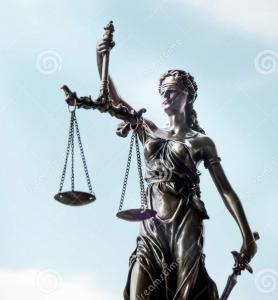
Representative Cori Bush of Missouri complained. “The judge. The jury. The defendant. It’s white supremacy in action. This system isn’t built to hold white supremacists accountable. It’s why Black and brown folks are brutalized and put in cages while white supremacist murderers walk free.”
Celebrity NFL quarterback Colin Kaepernick declared that this was the final proof of a “system built on white supremacy.” This “further validates the need to abolish our current system.”
The court’s justice was met by those protesting the court’s injustice.
In response to the justice meted out by the Kenosha jury, conservative groups supporting gun rights celebrated.
Was the immature Kyle Rittenhouse pursuing a kind of justice in his own way? Esther O’Reilly thinks so. “He knew something was deeply wrong. He knew people and their livelihoods were at risk, and someone needed to help. And he wanted, desperately, to be that someone. And for that, Kyle Rittenhouse was no fool.”
Eternal Justice and Self-Justification
The good news is that we human beings are inclined toward justice. We want to be just. We want everyone around us to be just. We want our civil society to adhere to the principles of justice in its distributive, retributive, and restorative forms.
The bad news is that we deny our sin. We think of our violence and even murder as good, not evil. Why? Because it is done in the service of justice. No matter how much havoc we wreak, it is justified.
C. Don Jones reminded us of Matthew 7:1-2, where Jesus tells us to withhold our judgement against those we deem unjust. I’d like to remind us of Romans 8:33b: “God is the one who justifies.” Or, justice is God’s business. At least eternal justice is God’s business. What you and I think is justice risks becoming one more link in a chain that binds us to violence ad infinitum.
We judge ourselves as just, even though justification is God’s business. We judge others as unjust. They may in fact be unjust, to be sure; but it seems oh so very important to us to feel that we are on the side of justice. That makes us dangerous.
Justice is a dangerous thing. It maims and kills and destroys. Yet, under every circumstance, we want to think of ourselves as justified by justice. That is what the light shining from the Reformation principle of justification-by-faith reveals about our human condition.
Conclusion
Now, I’d like to draw out the practical implications of declaring justice as just a chain of serial violence. But, I’m not confident I know what the implications would be.
One practical implication might be to commit oneself to withholding judgment against every person we deem to be unjust. We might commit ourselves to avoid scapegoating by avoiding mobs who share our ideologies. We could become passivists. But, then the racists, thugs, bullies, and tyrants would dominate our society.
So, rather than passivism, let’s try activism. To be an activist we must render judgments about who is just and who is unjust. Might we make a mistake? Yes, indeed. But, better to make a mistake once in a while than to allow violence to go unchecked. If eternal justice is God’s business, and if we are justified-by-faith, then we could thank God for divine grace and sin boldly.
▓
 Ted Peters is a Lutheran pastor and emeritus seminary professor. His one volume systematic theology is now in its 3rd edition, God—The World’s Future (Fortress 2015). He has undertaken a thorough examination of the sin-and-grace dialectic in two works, Sin: Radical Evil in Soul and Society (Eerdmans 1994) and Sin Boldly! (Fortress 2015). Watch for his forthcoming, The Voice of Public Christian Theology (ATF 2022). See his website: TedsTimelyTake.com.
Ted Peters is a Lutheran pastor and emeritus seminary professor. His one volume systematic theology is now in its 3rd edition, God—The World’s Future (Fortress 2015). He has undertaken a thorough examination of the sin-and-grace dialectic in two works, Sin: Radical Evil in Soul and Society (Eerdmans 1994) and Sin Boldly! (Fortress 2015). Watch for his forthcoming, The Voice of Public Christian Theology (ATF 2022). See his website: TedsTimelyTake.com.
▓








